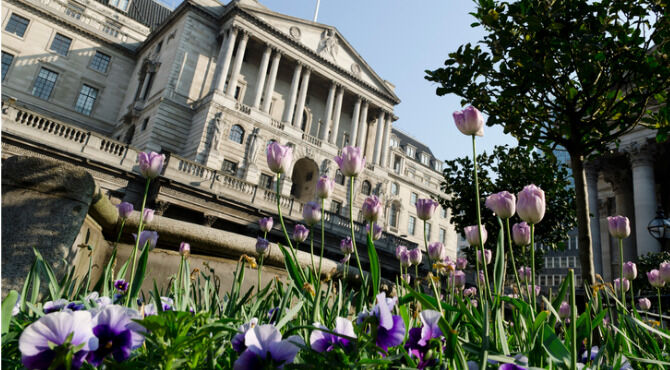Bank of England rules out any UK recession
As it raised interest rates on Thursday, the Bank of England radically overhauled its outlook for the UK economy, ruling out previous forecasts of a recession.

 11 May 2023
11 May 2023*Out now: the spring issue of Think Global People magazine*
Last November, the bank's Monetary Policy Committee (MPC) was warning the economy was about to enter the longest recession in its history, lasting two years.In February, that forecast was amended to suggest the recession would last a year or so.Now the bank, which raised interest rates from 4.25 to 4.5 per cent on Thursday, has all but discounted any downturn.Related reading from Relocate Global
- UK stock market overhaul to revive the City of London
- Accelerating growth: are the brakes coming off global immigration policies?
- Fresh optimism over UK growth prospects
Economic growth set to take upward trajectory
"UK gross domestic product (GDP) is expected to be flat over the first half of this year, although underlying output, excluding the estimated impact of strikes and an extra bank holiday, is projected to grow modestly," reported the MPC."Economic activity has been less weak than expected in February, and the committee now judges that the path of demand is likely to be materially stronger than expected in the February Report, albeit still subdued by historical standards."The bank expects the momentum of GDP to pick up in the second half of 2023 after increasing by 0.2 per cent in the first quarter of the year, and after an anticipated rise of the same amount between April and June.More interest rate rises to come?
Economists had widely been predicting the latest interest rates rise in the face of continuing inflationary pressures - particularly in food prices, mainly as a result of the war in Ukraine - and after both the Federal Reserve and the European Central Bank raised their base rates last week.Former IMF chief economist Mohamed El-Erian, now president of Queens' College Cambridge and an adviser to insurer Allianz, said he would not be surprised if the bank raised rates again in June to bring down inflation.He told BBC Radio 4’s Today programme: “The case for a rate rise is very simple. Inflation remains too high and there is evidence that inflationary pressures are persistent."And we have to follow what the Federal Reserve has done. So when you put all that together, the Bank of England has no choice but to raise interest rates and that is what the market is priced for.”Interest rates weigh on capital investments
While business leaders appreciate the need for a substantial base rate to tackle inflation, they have expressed fears that the latest increase - the 12th in a row - could have a deleterious impact on borrowing and investment.David Bharier, head of research at the British Chambers of Commerce, said: “The unprecedented and prolonged spike in inflation has been devastating for many small firms who have been struggling to absorb continued price rises.“But interest rate rises can also have serious negative effects too, particularly for firms looking to borrow to manage their cash flow problems. Our most recent Quarterly Economic Survey found that interest rates were a concern for 47 per cent of hospitality firms. The combination of high interest rates and high inflation would mean the worst of both worlds for many small firms.“The UK government should consider further action to break this vicious cycle by boosting economic growth - through investment in infrastructure, skills training, and global trade.”Anna Leach, deputy chief economist at the Confederation of British Industry (CBI), warned that what will happen to interest rates in the future remained uncertain."With ongoing bouts of banking sector turbulence in the US, risks to financial stability seem likely to persist as global interest rates continue to ratchet up and the full impact of past rises continues to feed through," she said. "While credit costs have so far adjusted smoothly, further material turbulence could yet disrupt activity, requiring a looser monetary stance. "On the other hand, inflation could surprise to the upside, particularly if wage rises remain elevated, suggesting further rate rises."The MPC has again been driven to raise rates by stubbornly high inflation, ongoing strength in wage growth and better-than-expected activity."Join us on 8 June for The Innovation Festival for Global Working. For more information click here
Subscribe to Relocate Extra, our monthly newsletter, to get all the latest international assignments and global mobility news.Relocate’s new Global Mobility Toolkit provides free information, practical advice and support for HR, global mobility managers and global teams operating overseas.
©2026 Re:locate magazine, published by Profile Locations, Spray Hill, Hastings Road, Lamberhurst, Kent TN3 8JB. All rights reserved. This publication (or any part thereof) may not be reproduced in any form without the prior written permission of Profile Locations. Profile Locations accepts no liability for the accuracy of the contents or any opinions expressed herein.

























